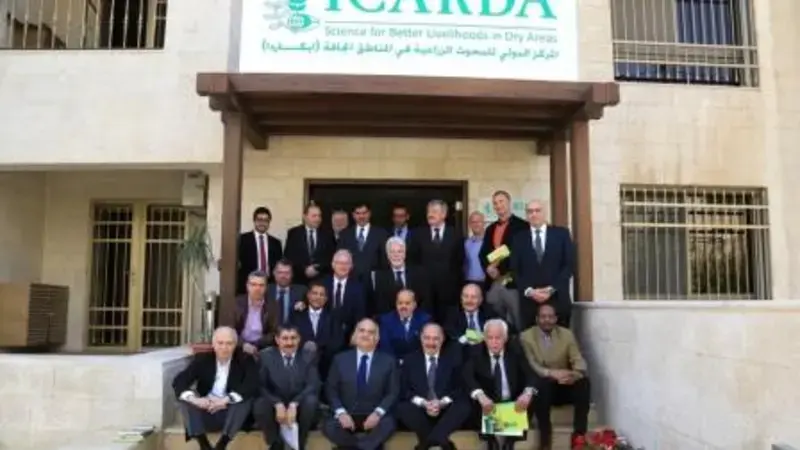A new vision for the 'Badia'

Communities struggle to make a living in Jordan’s ‘Badia’ – a dry, parched region that stretches across most of the country’s land mass, which is exposed to rising temperatures, increasing water scarcity, and persistent poverty. Productivity is low and employment opportunities are scarce, fuelling out-migration to cities and depleting the human resources that are crucial to the region’s development. While unique in Jordan, the challenges of the ‘Badia’ are similar to those faced by many marginal dry areas globally.
A ‘cycle of poverty’ is often spoken of when people refer to the ‘Badia’ – as people sink into poverty they are forced to degrade the natural resource base they depend upon, removing one of the few available routes out of poverty. The result: persistent and entrenched under-development.
There have been efforts to improve this situation in the past – many with some success – but these attempts were small-scale and confined to specific locations, limiting their impacts over a wider area.
Given the immense challenges facing the region, something more ambitious and strategic is required, a much grander, region-wide vision capable of addressing production and livelihood constraints on a large-scale, while exploiting opportunities for development and growth.
A special brainstorming session convened by His Royal Highness Prince Hassan Bin Talal of Jordan at ICARDA’s Amman offices initiated discussions on what this vision would look like: the policies, institutions, technologies, and innovations required to transform the region. And more importantly, the meeting discussed the need for increased and better targeted investments in ‘Badia’ research and development.
The session convened individuals from across the country’s agricultural sector, including representatives from academic institutions, and public and private sector organizations such as the Ministry of Agriculture and the Royal Council for Science and Technology. Also present were senior scientists from ICARDA well-versed in the challenges facing Jordan’s marginal environments, including the Center’s Director General, Dr. Mahmoud Solh.
On-going discussions will form the basis of a feasibility study – a foundation on which to build a transformative agenda and a practical strategy that can be presented to prospective donors.
Discussions focused on the following: priority areas for research and development; proven technology packages ready for dissemination; methodologies to achieve effective community participation; appropriate policies and institutional reforms; and the roles and responsibilities of the public and private sectors.
A range of practices and innovations were presented, including practical and cost-effective water harvesting techniques; contour laser-guiding micro-catchments; and appropriate livestock management, including the introduction of sustainable forage.
Discussions also focused on the potential of market-oriented livestock production – producing value-added products such as yogurt and cheese – and diversification through the use of protected agriculture, dryland fruit trees, and cactus, which could help strengthen community resilience against the effects of climate change.
Then there is the wider policy context, or enabling environment: it was agreed that a detailed policy analysis is needed to identify the policies that currently work, those that are ineffective or harmful, and the policies needed to transform the ‘badia’ from a region of neglect to one of high productivity and economic vitality.
ICARDA offers significant expertise in these areas – bringing an integrated strategy that addresses the full constellation of factors affecting productivity across the ‘Badia.’ “Our plan needs to be targeted, practical, and integrated,” argued Dr. Mahmoud Solh, ICARDA’s Director General. “A far-reaching strategy needs to incorporate a full range of inputs – improved varieties, technologies that are capable of using scarce water more productively, farming practices that conserve natural resources, and a policy and institutional environment that helps facilitate the widespread application of these innovations.”
It was envisaged that the private sector would play a strategic role to support the ‘Badia’s’ transformation – establishing small enterprises with the business acumen required to tackle the region’s spiraling unemployment, particularly among the young.
An effective community engagement plan is also required - a participatory approach that includes beneficiaries in decision-making and the adoption of appropriate technologies and techniques applied to their specific environmental context. ICARDA has tried and tested methodologies such as innovation platforms, which can provide a framework to guide such engagement.
Finally, looking beyond the Jordanian ‘Badia,’ there could be benefits for marginal dryland regions elsewhere – technologies, practices, and approaches developed in Jordan will be considered international public goods made available for communities and countries throughout the world’s dry areas.
Given the on-going instability in the wider region, and the links between food insecurity, low productivity, and social unrest, these contributions could be decisive long-term, according to HRH Prince Hassan Bin Talal. Speaking at the session, Prince Hassan commented: “Social cohesion within our region will require an integrated and thematic approach to water, land and energy - as well as the human environment and good governance. There is a chance for stability only if we address the stability of our marginal areas.”
